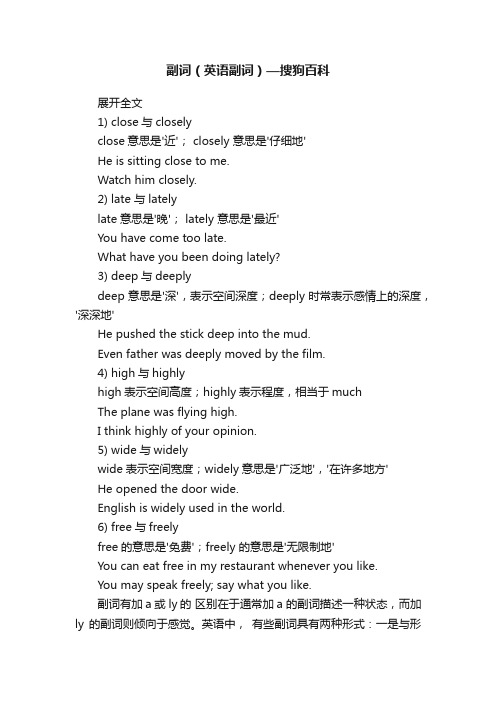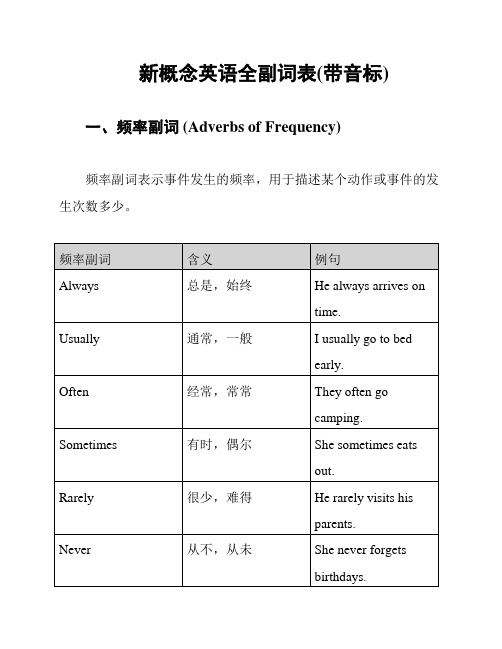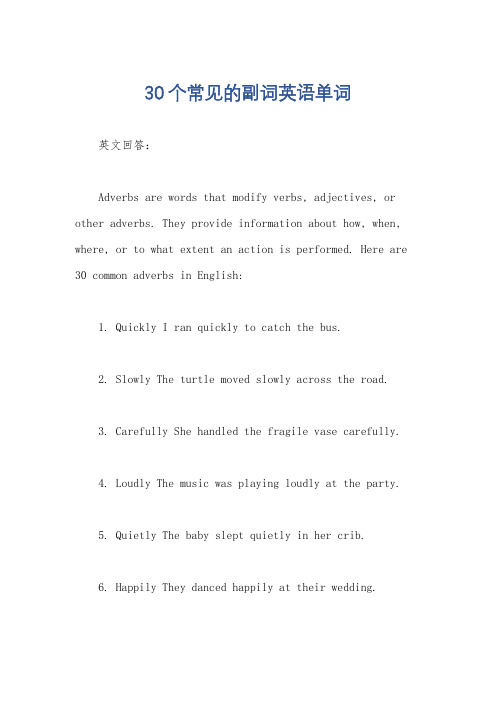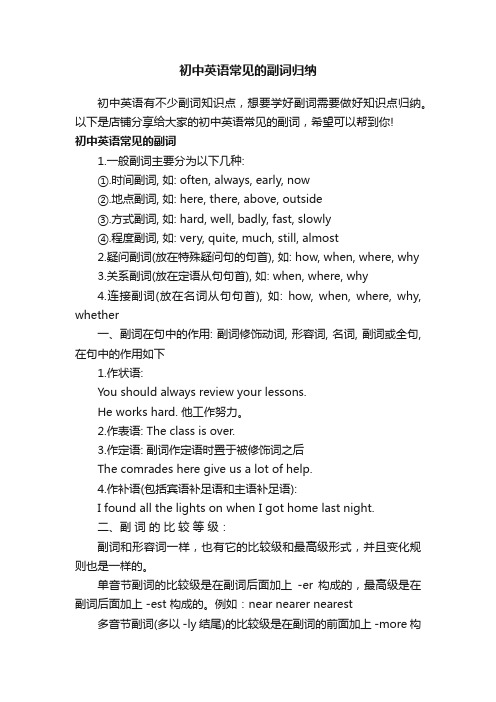英语讲座13 不可缺少的副词
2021小升初英语总复习13副词讲义+练习

第十三讲副词一.副词的作用1.修饰1)eg:He runs quickly........(副词修饰动词,放在动词的____面。
)2)eg:She is very....beautiful.(副词修饰______词)3)eg:He does his homework very....carefully.(副词修饰_____词)练习: ①The boy did the homework__________.(quick)②He writes __________(bad).③Please write________(slow)and____________(careful).④Does Nancy sing __________ (well) than Helen?⑤用所给词的适当形式填空He sings__________and he is a good singer.(good)2.分类1)方式副词:(1)副词的原级比较:“as+副词原形+as”eg:He runs as quickly as his brother.翻译:Jim写作业和Tim一样认真。
Jim does his homework ____ ____________ ____Bill.(2)副词的比较级和最高级用法:和形容词一样,副词也有比较级和最高级①规则:fast快更快_________ 最快____________early早更早_________ 最早____________不规则:well-better-best badly-worse-worst②比较级表示两者间“更”:eg:Betty plays tennis better than her brother.贝蒂打网球比她哥哥强。
练习:Lucy smiled______________(happy)than Lily.Sally goes to school ________(early)than Suzy.Who can sing better _________Rose? A. than B. then C./③最高级表示多者间“最”:eg:Who swims (the)best in your team?你们队谁游泳最棒?注意:副词最高级前可用定冠词the,也可以不用。
副词(英语副词)—搜狗百科

副词(英语副词)—搜狗百科展开全文1) close与closelyclose意思是'近'; closely 意思是'仔细地'He is sitting close to me.Watch him closely.2) late 与latelylate意思是'晚'; lately 意思是'最近'You have come too late.What have you been doing lately?3) deep与deeplydeep意思是'深',表示空间深度;deeply时常表示感情上的深度,'深深地'He pushed the stick deep into the mud.Even father was deeply moved by the film.4) high与highlyhigh表示空间高度;highly表示程度,相当于muchThe plane was flying high.I think highly of your opinion.5) wide与widelywide表示空间宽度;widely意思是'广泛地','在许多地方'He opened the door wide.English is widely used in the world.6) free与freelyfree的意思是'免费';freely 的意思是'无限制地'You can eat free in my restaurant whenever you like.You may speak freely; say what you like.副词有加a或ly的区别在于通常加a 的副词描述一种状态,而加ly 的副词则倾向于感觉。
英语中,有些副词具有两种形式:一是与形容词同形;二是由该形容词后加-ly构成(以下称形容词形副词和-ly形副词)。
初中英语知识点总结:英语副词精华讲解

初中英语知识点总结:英语副词精华讲解一. 定义:副词主要用来修饰动词,形容词,副词或其他结构。
一般副词主要分为以下几种:①.时间副词, 如: often, always, early, now②.地点副词, 如: here, there, above, outside③.方式副词, 如: hard, well, badly, fast, slowly④.程度副词, 如: very, quite, much, still, almost2.疑问副词(放在特殊疑问句的句首), 如: how, when, where, why3.关系副词(放在定语从句句首), 如: when, where, why4.连接副词(放在名词从句句首), 如: how, when, where, why, whether二. 副词的位置:1) 在实义动词之前。
2) 在be动词、助动词之后。
3) 多个助动词时,副词一般放在第一个助动词后。
注意:a. 大多数方式副词位于句尾,但宾语过长,副词可以提前,以使句子平衡。
例如:We could see very clearly a strange light ahead of us.我们清楚地看到前面有奇怪的光。
b. 方式副词well,badly,hard等只放在句尾。
例如:He speaks English well. 他英语说得好。
三. 副词的排列顺序:1) 时间,地点副词,小单位的在前,大单位在后。
2) 方式副词,短的在前,长的在后,并用and或but等连词连接。
例如:Please write slowly and carefully. 请写得慢一些,仔细一些3) 多个不同副词排列:程度+地点+方式+时间副词。
注意:副词very 可以修饰形容词,但不能修饰动词。
改错:(错)I very like English.(对)I like English very much.注意:副词enough要放在形容词的后面,形容词enough放在名词前后都可。
英语副词讲义

副词一、副词定义:副词是一种用来修饰动词、形容词、全句的词,说明时间、地点、程度、方式等概念的词。
副词是一种半虚半实的词。
二、副词的分类:副词可分为:时间副词、地点副词、方式副词、程度副词、频度副词、焦点副词、疑问副词和连接副词。
副词连用顺序:程度副词+方式副词+地点副词+时间副词。
1、时间副词(1)、常见的时间副词now(现在;立刻;目前;马上;其时;当时) then(当时;那时;接着;于是;然后;还有;而且;那么;因此)soon(不久;即刻;马上;宁可;;宁愿) ago(以前)recently (最近;近来)lately(近来;最近;不久前)later(较晚地;后来)finally(最后;终于;完全地)before(先前;从前;以前)early(早;先;在初期;在早期)today (今天)tomorrow(明天)yesterday(昨天)tonight(今晚)suddenly(意外地;忽然;冷不防)immediately(即刻;马上;直接地) already(已经)just(刚刚)等。
(2)、时间副词在句中的位置○1、表确定时间的副词(如today, yesterday等)通常位于句末,有时也位于句首:He went home yesterday. / Yesterday he went home. 他昨天回家了。
○2、表示非确定时间的副词(如soon, recently, suddenly等)除可用于句末或句首外,还可位于句中(通常位于实义动词之前,动词be、助动词、情态动词之后):He went to Paris recently. / He recently went to Paris. / Recently he went to Paris.最近他去了巴黎。
○3、still, already, just 等几个表示时间的副词通常位于句中(实意动词之前,动词be、助动词、情态动词之后):He’s just left for school. 他刚刚去学校。
新概念英语全副词表(带音标)

任何地方
You can sit anywhere you like.
以上是新概念英语全副词表(带音标)的完整版,希望对你的研究有所帮助!
Often
经常,常常
They often go camping.
Sometimes
有时,偶尔
She sometimes eats out.
Rarely
很少,难得
He rarely visits his parents.
Never
从不,从未
She never forgets birthdays.
二、程度副词(Adverbs of Degree)
新概念英语全副词表(带音标)
一、频率副词(Adverbs of Frequency)
频率副词表示事件发生的频率,用于描述某个动作或事件的发生次数多少。
频率副词
含义
例句
Always
总是,始终
He always arrives on time.
Usually
通常,一般
I usually go to bed early.
Today
今天
I will meet her today.
Yesterห้องสมุดไป่ตู้ay
昨天
I saw him yesterday.
Tomorrow
明天
We have a meeting tomorrow.
Soon
不久,很快
The film will start soon.
四、地点副词(Adverbs of Place)
程度副词用于描述动作或状态的程度,强调某个动作或情况的强弱程度。
程度副词
30个常见的副词英语单词

30个常见的副词英语单词英文回答:Adverbs are words that modify verbs, adjectives, or other adverbs. They provide information about how, when, where, or to what extent an action is performed. Here are 30 common adverbs in English:1. Quickly I ran quickly to catch the bus.2. Slowly The turtle moved slowly across the road.3. Carefully She handled the fragile vase carefully.4. Loudly The music was playing loudly at the party.5. Quietly The baby slept quietly in her crib.6. Happily They danced happily at their wedding.7. Sadly The news made her feel very sad.8. Bravely The firefighter entered the burning building bravely.9. Angrily He shouted angrily at his brother.10. Gently The mother hugged her child gently.11. Accidentally She accidentally spilled coffee on her shirt.12. Clearly The teacher explained the lesson clearly.13. Suddenly The car stopped suddenly to avoid hitting the pedestrian.14. Quietly The students listened quietly to the lecture.15. Cautiously The hiker cautiously climbed up the steep mountain.16. Carelessly He carelessly left his phone on the bus.17. Happily The children played happily in the park.18. Sadly The dog wagged its tail sadly when its owner left.19. Patiently She waited patiently for her turn in line.20. Nervously He tapped his fingers nervously on the table.21. Loudly The crowd cheered loudly at the concert.22. Softly The wind blew softly through the trees.23. Silently The cat crept silently towards its prey.24. Quickly The chef chopped the vegetables quickly.25. Slowly The old man walked slowly with a cane.26. Politely She smiled politely and thanked the waiter.27. Rudely He spoke rudely to his coworker.28. Happily The couple smiled happily in their wedding photos.29. Sadly The little girl cried sadly when she lost her toy.30. Calmly She handled the stressful situation calmly.中文回答:副词是用来修饰动词、形容词或其他副词的词语。
30个副词英语

30个副词英语副词是一类在句子中修饰动词、形容词、副词、全句或者整个句子的词语。
它们可以提供更多的细节和信息,丰富句子的表达。
在英语中,副词扮演着重要角色,使得句子更加生动有力。
下面将为你介绍30个常用的英语副词。
1. Adoringly(崇拜地)- She looked at him adoringly, impressed by his talent.2. Angrily(生气地)- He shouted angrily at the referee after the game.3. Briskly(轻快地)- The dog walked briskly through the park, excited to be outside.4. Carefully(小心地)- She handled the fragile vase carefully, fearing it might break.5. Deliberately(故意地)- He deliberately ignored her, wanting to geta reaction.6. Eagerly(渴望地)- The children eagerly lined up for ice cream on a hot summer day.7. Frantically(疯狂地)- She searched frantically for her lost keys, turning the house upside down.8. Gently(温柔地)- The mother held her baby gently, rocking him to sleep.9. Happily(开心地)- They danced happily at the wedding, celebrating the couple's joy.10. Incessantly(不停地)- The rain fell incessantly throughout the night, keeping them awake.11. Joyfully(快乐地)- The children laughed joyfully as they played in the park.12. Luxuriously(奢侈地)- They enjoyed a luxuriously appointed hotel suite on their vacation.13. Mysteriously(神秘地)- The magician disappeared mysteriously behind the curtain, leaving the audience in awe.14. Nervously(紧张地)- He tapped his fingers nervously on the table, waiting for the interview to start.15. Optimistically(乐观地)- Despite the challenges, she approached the situation optimistically.16. Patiently(耐心地)- The teacher patiently explained the concept to the confused student.17. Quickly(快速地)- He ran quickly to catch the bus before it left.18. Reluctantly(勉强地)- She reluctantly accepted the invitation, knowing she had other commitments.19. Seriously(认真地)- He studied seriously for the exam, determined to achieve a high score.20. Tightly(紧紧地)- She hugged her friend tightly, not wanting to let go.21. Unbelievably(难以置信地)- The news of their engagement was unbelievably exciting.22. Vividly(生动地)- The author described the scene vividly, making readers feel like they were there.23. Wistfully(留恋地)- He looked wistfully at the old photo, reminiscing about the past.24. Yearningly(渴望地)- The athlete yearned yearningly for victory, training hard every day.25. Zealously(热情地)- She worked zealously on her project, determined to make it the best.26. Abruptly(突然地)- The phone rang abruptly, startling everyone in the room.27. Carelessly(粗心地)- She carelessly knocked over the glass, causing it to shatter.28. Honestly(诚实地)- He spoke honestly about his mistakes, wanting to make amends.29. Painfully(痛苦地)- The injured player walked painfully off the field, clutching his leg.30. Quietly(安静地)- They sat quietly in the library, studying for their exams.这些副词可以帮助你丰富句子的表达,使其更具感染力和准确性。
初中英语常见的副词归纳

初中英语常见的副词归纳初中英语有不少副词知识点,想要学好副词需要做好知识点归纳。
以下是店铺分享给大家的初中英语常见的副词,希望可以帮到你!初中英语常见的副词1.一般副词主要分为以下几种:①.时间副词, 如: often, always, early, now②.地点副词, 如: here, there, above, outside③.方式副词, 如: hard, well, badly, fast, slowly④.程度副词, 如: very, quite, much, still, almost2.疑问副词(放在特殊疑问句的句首), 如: how, when, where, why3.关系副词(放在定语从句句首), 如: when, where, why4.连接副词(放在名词从句句首), 如: how, when, where, why, whether一、副词在句中的作用: 副词修饰动词, 形容词, 名词, 副词或全句, 在句中的作用如下1.作状语:You should always review your lessons.He works hard. 他工作努力。
2.作表语: The class is over.3.作定语: 副词作定语时置于被修饰词之后The comrades here give us a lot of help.4.作补语(包括宾语补足语和主语补足语):I found all the lights on when I got home last night.二、副词的比较等级:副词和形容词一样,也有它的比较级和最高级形式,并且变化规则也是一样的。
单音节副词的比较级是在副词后面加上-er 构成的,最高级是在副词后面加上 -est 构成的。
例如:near nearer nearest多音节副词(多以 -ly 结尾)的比较级是在副词的前面加上 -more 构成的。
最高级是在副词前面加上-most 构成的.例如;warmly more warmly most warmly有些副词的比较级和最高级形式是不规则的:well-better - best little - less - leastmuch- more - most badly - worse - worstfar-farther(further)-farthest(furthest)副词的比较级和最高级用法同形容词的比较级用法基本一样,两者比较用比较级,三者或以上用最高级,但是副词最高级形式句中the 可以省略。
- 1、下载文档前请自行甄别文档内容的完整性,平台不提供额外的编辑、内容补充、找答案等附加服务。
- 2、"仅部分预览"的文档,不可在线预览部分如存在完整性等问题,可反馈申请退款(可完整预览的文档不适用该条件!)。
- 3、如文档侵犯您的权益,请联系客服反馈,我们会尽快为您处理(人工客服工作时间:9:00-18:30)。
英语讲座13 不可缺少的副词
副词指的是用以修饰动词、形容词、其他副词及全句,以说明时间、地点、程度、方式等概念的词,由定义就可看出,副词的出现不仅点多而且面广,这也决定了副词在高考中的形式考查的多样性,也加大了副词的应用难度。
●难点磁场
1.(★★★★★)It’s always difficult being in a foreign country________if you don’t speak the language. (2000高考)
A.extremely
B.naturally
C.basically
D.specially
2.(★★★★)Fred is second to none in maths in our class,but believe it or not,he________ passed to the last exam. (上海2000)
A.easily
B.hardly
C.actually
D.successfully
3.(★★★★★)When you turn on the TV set.Clear pictures will________ appear on the screen. (上海春季高考2001)
A.rapidly
B.hurriedly
tely
D.immediately
4.(★★★★★)He left in such a hurry that I________ had time to thank him.
A.almost
B.even
C.most
D.hardly
5.(★★★★)—What do you think of his words?
—What he said sounds________.
A.nicely
B.pleasantly
C.friendly
D.wonderfully
6.(★★★★★)She wants to go to Beijing________.
te
tely
C.bad
D.badly
7.(★★★★★)I’ve got________work to do on such a ________ cold day.
A.much too;much too
B.too much;too much
C.too much;much too
D.much too;too much
8.(★★★★)Please hold the book________,for I can’t see the words clearly.
A.more closer
B.more closely
C.closely
D.closer
9.(★★★★★)Our weather here has been________ warm.
A.most
B.mostly
C.at most
D.best
10.(★★★★★)They said nothing,looking________at the headmaster.
A.coldly
B.sad
C.worried
D.excited
●案例探究
1.He often works________ into the night,which moves us________.
A.deep;deep
B.deeply;deeply
C.deep;deeply
D.deeply;deep
命题意图:考查某些具有两种形式的形容词之间的区别。
本题属于四星题。
知识依托:deep作副词讲时,仅表示具体意义,……深。
deeply作副词表示“深深地”,故应选C。
错解分析:误选其他答案的原因就在于对deep、deeply的用法及含义不明。
解题方法与技巧:(1)本题可依据要点从语意上考虑。
(2)对于有两种形式的副词,关键在于平时多积累,多识记相关单词。
在这里举例如下:
wide宽地widely广泛地
close近closely细心地
late 晚 lately 最近
high 高 highly 高度地
most 最 mostly 主要地
hard 努力地 hardly 几乎不
答案:C
2.Alice laid her baby on the sofa________ and wrapped it with a blanket.
(上海2000年高考)
A.silently
B.tenderly
C.friendly
fortably
命题意图:考查词意区分。
本题属于四星题。
知识依托:silently 沉默地,tenderly 温柔地,friendly 是形容词,意思是友好的,comfortably 舒服的。
错解分析:主要的错误在于词意不明。
解题方法与技巧:本题提醒我们,做题时词意是很重要的一点,同时也更要小心一些貌似副词的形容词,以免引起误选。
这里再举例如下:
⎪⎩
⎪⎨⎧英勇的友好的生动活泼的活的致命的死的形容词soliderly friendly lively live deadly dead
答案:B
●锦囊妙计
掌握副词的基本语法功能及意义。
1.分类
由词汇意义可分为时间、地点、方式、程度、频率及其他副词。
由句法功能分类有:疑问副词how,when,where …
连接副词when,whether ,why …
关系副词when ,where , why …
2.多辨析易混词
A.具有两种形式的副词,如上文中所讲的deep —deeply 。
B.almost,nearly 的区分与almost,most,mostly 的区分。
⎩
⎨⎧high. metres 6nearly is wall The .impossible almost ts I'eg. ⎪⎪⎩⎪⎪⎨⎧young.mostly are students
The ),most?(you interested What ).(graduation after salury highter have want to students M ost date. the forgotten almost ve I'eg.最副词形容词 ●歼灭难点训练
1.(★★★★★)We decided not to climb the mountains because it was raining________.
A.badly
B.hardly
C.strongly
D.heavily
2.(★★★★)—Do you remember________ he came?
—Yes,I do.He came by car.
A.how
B.when
C.that
D.if
3.(★★★★)—Can I help you?
—Well,I’m afraid the box is________ heavy for you,but thank you all the same.
A.so
B.much
C.very
D.too
4.(★★★★★)It was________ impossible for him to finish the work alone by five o’clock in the morning.
A.very
B.quite
C.too
D.much
5.(★★★★★)Jim is a kind boy.He is________ willing to help his classmates.
A.so
B.much
C.too
D.such
6.(★★★★★)—Did all of them go to the cinema?
—No.They________ went to the concert instead.
A.almost
B.mostly
C.most
D.nearly
7.(★★★★★)The lessons given by Mr.Smith are always________ and interesting.
A.loving
B.lovely
C.lively
D.vividly
8.(★★★★)—Where have you been?
—I’ve ________ been to the library.
A.ever
B.already
C.just
D.nearly
9.(★★★★★)It’s quite late now but Mr.Li________ hasn’t turned up.
A.yet
B.already
C.still
D.however
10.(★★★★)Tom couldn’t work the problem out because he wasn’t ________ clever.
A.much
B.that
C.a little
D.as。
